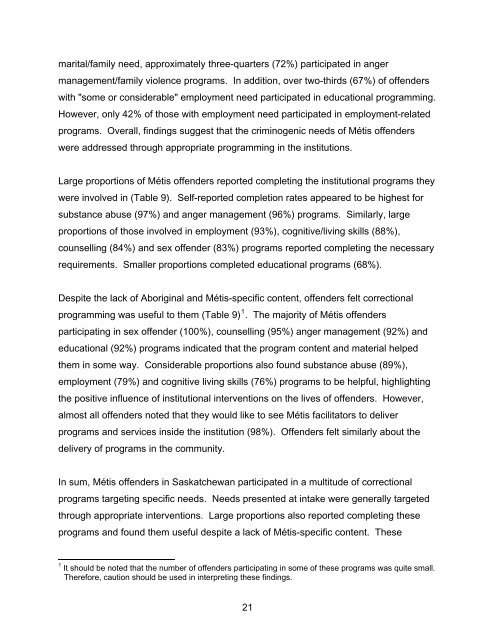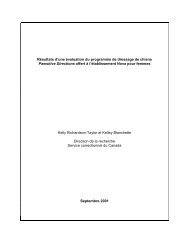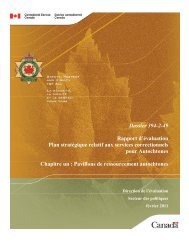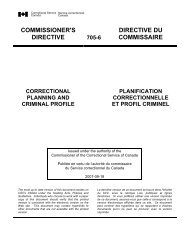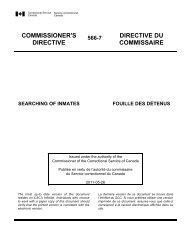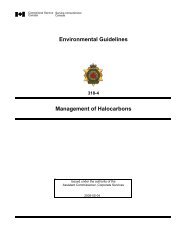Program and Service Needs of Federally Incarcerated Métis ...
Program and Service Needs of Federally Incarcerated Métis ...
Program and Service Needs of Federally Incarcerated Métis ...
Create successful ePaper yourself
Turn your PDF publications into a flip-book with our unique Google optimized e-Paper software.
marital/family need, approximately three-quarters (72%) participated in anger<br />
management/family violence programs. In addition, over two-thirds (67%) <strong>of</strong> <strong>of</strong>fenders<br />
with "some or considerable" employment need participated in educational programming.<br />
However, only 42% <strong>of</strong> those with employment need participated in employment-related<br />
programs. Overall, findings suggest that the criminogenic needs <strong>of</strong> <strong>Métis</strong> <strong>of</strong>fenders<br />
were addressed through appropriate programming in the institutions.<br />
Large proportions <strong>of</strong> <strong>Métis</strong> <strong>of</strong>fenders reported completing the institutional programs they<br />
were involved in (Table 9). Self-reported completion rates appeared to be highest for<br />
substance abuse (97%) <strong>and</strong> anger management (96%) programs. Similarly, large<br />
proportions <strong>of</strong> those involved in employment (93%), cognitive/living skills (88%),<br />
counselling (84%) <strong>and</strong> sex <strong>of</strong>fender (83%) programs reported completing the necessary<br />
requirements. Smaller proportions completed educational programs (68%).<br />
Despite the lack <strong>of</strong> Aboriginal <strong>and</strong> <strong>Métis</strong>-specific content, <strong>of</strong>fenders felt correctional<br />
programming was useful to them (Table 9) 1 . The majority <strong>of</strong> <strong>Métis</strong> <strong>of</strong>fenders<br />
participating in sex <strong>of</strong>fender (100%), counselling (95%) anger management (92%) <strong>and</strong><br />
educational (92%) programs indicated that the program content <strong>and</strong> material helped<br />
them in some way. Considerable proportions also found substance abuse (89%),<br />
employment (79%) <strong>and</strong> cognitive living skills (76%) programs to be helpful, highlighting<br />
the positive influence <strong>of</strong> institutional interventions on the lives <strong>of</strong> <strong>of</strong>fenders. However,<br />
almost all <strong>of</strong>fenders noted that they would like to see <strong>Métis</strong> facilitators to deliver<br />
programs <strong>and</strong> services inside the institution (98%). Offenders felt similarly about the<br />
delivery <strong>of</strong> programs in the community.<br />
In sum, <strong>Métis</strong> <strong>of</strong>fenders in Saskatchewan participated in a multitude <strong>of</strong> correctional<br />
programs targeting specific needs. <strong>Needs</strong> presented at intake were generally targeted<br />
through appropriate interventions. Large proportions also reported completing these<br />
programs <strong>and</strong> found them useful despite a lack <strong>of</strong> <strong>Métis</strong>-specific content. These<br />
1 It should be noted that the number <strong>of</strong> <strong>of</strong>fenders participating in some <strong>of</strong> these programs was quite small.<br />
Therefore, caution should be used in interpreting these findings.<br />
21


